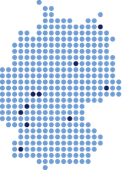Brain tumors are associated not only with large socio-economic costs but also with high psychosocial morbidity, as they affect the organ of consciousness and perception (“seat of the ego”). They are among the most lethal cancers with few currently available treatment options and represent the second most common cancer in children. In recent years, their treatment regimen has become increasingly individualized through the use of molecular markers with prognostic or predictive significance. Most importantly, recent genomic analyses have identified an extensive catalog of recurrent genetic mutations and epigenetic alterations in malignant brain tumors. With the Junior Research Group (NWG) “AI-RON: AI-assisted morphomolecular Precision Medicine in Neurooncology”, we aim to usher in the next era of morphomolecular diagnostics by developing Artificial Intelligence (AI)-based medical informatics pipelines to improve the quality and speed of brain tumor diagnosis, as well as personalize and (cost)-efficiently target therapeutic approaches.
The integration of histomorphological and molecular pathological changes is essential for oncology to make precision therapeutic decisions via accurate tumor classification and detection of therapeutic targets. Current challenges include applying machine learning algorithms to extract essential information from disparate high-dimensional data sources, defining and harmonizing analysis pipelines, and generating easily interpretable reports for clinicians. In this regard, the “Big Data” generated by “Next-Generation Sequencing” (NGS) analyses and digital histopathology, together with clinical meta-data such as survival rates and treatment regimens, provide a solid foundation for AI-based advancement of precision medicine.
The goal of the NWG will be to develop an AI-based precision analysis of whole-slide images (WSI) in combination with high-dimensional omics data and clinical metadata for classification and prognostic predictability of brain tumors as part of the medical informatics initiative MIRACUM. In this context, we can draw on a large data pool of the participating university hospitals within the framework of Use Case 2 “Neurooncology (from-data-to-knowledge)” (project management Gießen) of MIRACUM and evaluate aggregated neurooncological morphomolecular and clinical data across sites in a data protection compliant manner. The algorithms and pipelines developed within the NWG will prospectively extend to the integration of other high-dimensional data such as radiomics and other tumor entities. The NWG will thus make an important contribution to strengthening the subject area of the Medical Informatics Initiative in the important field of AI in health research and care.


0 comments on “AI-RON – the new junior research group takes up work at Justus-Liebig University of Gießen”